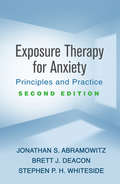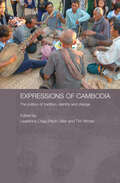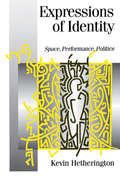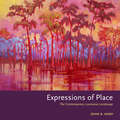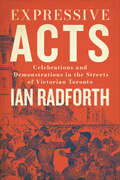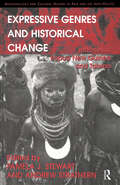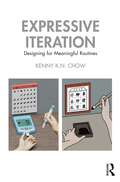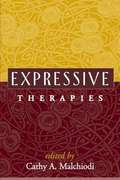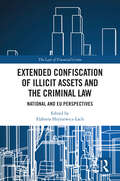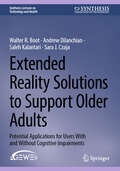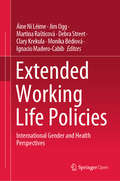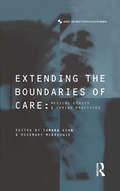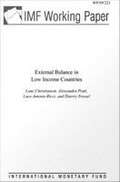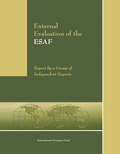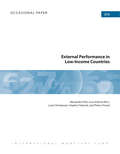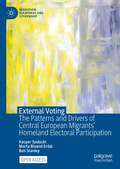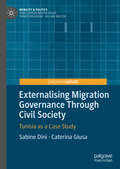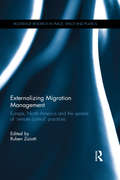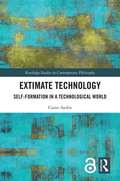- Table View
- List View
Exposure Therapy for Anxiety, Second Edition: Principles and Practice
by Jonathan S. Abramowitz Brett J. Deacon Stephen P. WhitesideNow revised and expanded to include cutting-edge acceptance-based techniques and a new focus on inhibitory learning, this is the leading guide to therapeutic exposure, a crucial element of evidence-based psychological treatments for anxiety. The book helps the clinician gain skills and confidence for implementing exposure successfully and tailoring interventions to each client's needs, regardless of diagnosis. The theoretical and empirical bases of exposure are reviewed and specialized assessment and treatment planning techniques described. User-friendly features include illustrative case examples, sample treatment plans, ideas for exercises targeting specific types of fears, and reproducible handouts and forms that can be downloaded and printed in a convenient 8½" x 11" size. New to This Edition *Chapter on acceptance and commitment therapy (ACT) techniques. *Reflects a shift in the field toward inhibitory learning--helping clients learn to tolerate anxiety and uncertainty to maximize long-term outcomes. *Chapter on uses of technology, such as computer-based therapy and virtual reality tools. *Conceptual, empirical, and clinical advances woven throughout.
Exposure Therapy with Children and Adolescents
by Michael A. Southam-GerowExposure therapy is highly effective for treating anxiety disorders in children and adolescents, yet implementation with youth and their parents entails unique challenges. Packed with clinical examples, this concise book provides practical, developmentally savvy guidelines for conducting therapeutic exposure with 5- to 18-year-olds. At each stage of the process, it addresses clinicians' most common questions and concerns. Coverage includes how to build a strong initial assessment; develop a fear ladder; individualize exposure exercises for different problem areas, including phobia, social anxiety, worry, separation anxiety, and panic; and monitor progress. Also discussed is when and how to integrate exposure with relaxation and cognitive strategies.
Expressions of Cambodia: The Politics of Tradition, Identity and Change (Routledge Contemporary Southeast Asia Series)
by Tim Winter Leakthina Chau-Pech OllierTaking a theoretical and multidisciplinary perspective, the essays in this collection provide compelling insight into contemporary Cambodian culture at home and abroad. The book represents the first sustained exploration of the relationship between cultural productions and practices, the changing urban landscape and the construction of identity and nation building twenty-five years after the fall of the Khmer Rouge regime. As such, the team of international contributors address the politics of development and conservation, tradition and modernity within the global economy, and transmigratory movements of the twenty-first century. Expressions of Cambodia presents a new dimension to the Cambodian studies by engaging the country in current debates about globalization and the commodification of culture, post-colonial politics and identity constructions. Timely and much-needed, this volume brings Cambodia back into dialogue with its neighbours, and in so doing, valuably contributes to the growing field of Southeast Asian cultural studies.
Expressions of Identity: Space, Performance, Politics (Published in association with Theory, Culture & Society)
by Kevin HetheringtonThis innovative book sets out to question what we understand by the term `new social movements'. By examining a range of issues associated with identity politics and alternative lifestyles, the author challenges those who treat new social movements as instances of wider social change while often ignoring their more `local' and `dispersed' importance. This book questions what it means to adopt an identity that is organised around issues of expressivism - and offers a series of non-reductionist ways of looking at identity politics. Hetherington analyzes expressive identities through issues of performance, spaces of identity and `the occasion'. This important work shows how the significance of identity politics are at once local, plural, situated and topologically complex.
Expressions of Place: The Contemporary Louisiana Landscape
by John R. KempExpressions of Place embarks on a journey across the rural and urban landscapes of Louisiana via the talents of thirty-seven artists located all around the state. Many are acclaimed professionals whose paintings are included in major private and public collections regionally and nationally. Others have found their followings closer to home. All, however, strive to express impressions of the land with artistic styles that range from traditional to the symbolic and almost totally abstract. Such a variety of interpretation becomes possible in a landscape that changes from dark cypress-shrouded bayous, trembling earth, grassy prairies, the gritty streets of inner city New Orleans to vast wind-swept coastal marshes and the piney hills of north and central Louisiana. Rather than stand as an encyclopedia, catalog, or history of the visual arts in Louisiana, Kemp's book is instead a celebration of the state's evocative landscape in the work of accomplished contemporary artists. It includes an introductory essay, which places these creators and their works in historical context. Expressions of Place provides readers with individual essays and biographical sketches in which the artists, in their own words, give insight as to what they paint, how they paint, where they paint, and why they are drawn to the Louisiana landscape. Particularly inspiring, the artists discuss their interpretations of that landscape directly with the viewing audience. Expressions of Place remains as much about the landscape of the artists' imaginations as it is about the land itself. With each painting, they have created visual poetry of a land and environment that has become a defining part of their lives.
Expressive Acts: Celebrations and Demonstrations in the Streets of Victorian Toronto
by Ian RadforthIn nineteenth-century Toronto, people took to the streets to express their jubilation on special occasions, such as the 1860 visit of the Prince of Wales and the return in 1885 of the local Volunteers who helped to suppress the Riel resistance in the North-West. In a contrasting mood, people also took to the streets in anger to object to government measures, such as the Rebellion Losses bill, to heckle rival candidates in provincial election campaigns, to assert their ethno-religious differences, and to support striking workers. Expressive Acts examines instances of both celebration and protest when Torontonians publicly displayed their allegiances, politics, and values. The book illustrates not just the Victorian city’s vibrant public life but also the intense social tensions and cultural differences within the city. Drawing from journalists’ accounts in newspapers, Expressive Acts illuminates what drove Torontonians to claim public space, where their passions lay, and how they gave expression to them.
Expressive Genres and Historical Change: Indonesia, Papua New Guinea and Taiwan (Anthropology and Cultural History in Asia and the Indo-Pacific)
by Andrew StrathernThis collection of essays, edited by leading scholars in the field, focuses on how expressive genres such as music, dance and poetry are of enduring significance to social organization. Research from New Guinea, Indonesia and Taiwan is used to assess how historical changes modify these forms of expression to adjust to the social and political needs of the moment. The volume is unique in exploring the significance of expressive genres for the social processes of coping with and adjusting to change, either from outside forces or from internal ones. The contributions detail first-hand fieldwork, often conducted over a period of many years, and with each contributor bringing their experience to bear on both the aesthetic and the analytical aspects of their materials. Comparative in scope, the volume covers Austronesian and non-Austronesian speakers in the wider Indo-Pacific region.
Expressive Iteration: Designing for Meaningful Routines
by Kenny K.N. ChowA ground-breaking guide to thinking about how routine activities can be designed and innovated to develop narrative meaning and a sense of purpose.Iteration is an integral part of daily routines, such as sleep-wake cycles, commuting, workouts, chores, or practising an instrument. While many iterations just monotonously repeat, others can lead to progression or evolution. With subtle variations among iterations, we can create meaning out of repetitive acts, forging narratives from them and thus making them meaningful to us. Chow draws on rhetoric, psychology, narratology, and design-thinking to show both in theory and in practice how we can innovate the design of mundane and routine activities to give them meaning and expression. He does so by examining Asian and European-originated examples, across a range of domains including visual arts, literature, digital art, video games, and mobile applications.A must-read for designers and enthusiasts looking for ways to innovate across all domains and media and transform tedious repetitive activities into acts of intention.
Expressive Therapies
by Cathy A. MalchiodiPsychotherapists, counselors, and other health care professionals are increasingly turning to expressive therapies--including art, music, dance/movement, drama, poetry, play, sandtray, and integrative approaches--in their work with clients of all ages. This timely volume offers a comprehensive presentation of these innovative and powerful modalities. Expert contributors present in-depth descriptions of their respective approaches to intervention with children, adults, and groups, giving particular attention to strategies for integrating expressive work with other forms of psychotherapy.
Expressive Therapies for Sexual Issues
by Sana LoueThis text is intended to help social work practitioners move beyond both these often-accepted constructions of sexuality and the range of methods that are available to social workers in their clinical practice. Various themes are apparent throughout each of the chapters in this volume: the range of sexual experience and expression that exists across individuals; a recognition of our society's responses to expressions of sexuality, including the social, attitudinal, and cultural barriers that inhibit the expression of healthy sexuality and that constrain our approaches to assisting individuals with their recovery from trauma; the need to consistently and painstakingly examine our own assumptions relating to sexuality in order to be more effective with our clients; and the delicate balance that is often required when working with clients around issues of sexuality in the context of institutions, community, and societal structures.
Expressive Therapy With Elders and the Disabled: Touching the Heart of Life
by Jules C WeissA classic book on the use of expressive therapies with uncommunicative elders and the disabled. This poignant guide explores group and individual therapeutic activities that promote creativity, self-expression, communication, and understanding of one’s life. An experienced art therapist relates his insights into the psychosocial dynamics of elders and the disabled and shares his awareness of the sensitivity and understanding required to reach the “unreachable.” Health care workers will find this illustrated volume rich in therapeutic techniques and processes applicable to the care and growth of psychologically and physically disabled or minimally handicapped adults and elders.
Expressivist Religious Zionism: Modernity and the Sacred in a Nationalist Movement (Routledge Jewish Studies Series)
by Shlomo FischerThis book presents a new approach to the study of Religious Zionism. In counter-distinction to the prevalent fundamentalist approach, it argues that mainstream of Religious Zionism is a romantic religious nationalist movement in which the modern idea of self-expression and related notions, such as the free and authentic self and the overcoming of alienation, forms its philosophical core.By showing how such notions are combined with conservative and un-modern cultural and political goals (such as the restoration of a messianic kingdom), it provides a profoundly complex and nuanced account both of pervasiveness of modern notions in contemporary culture and of the modern aspects of conservative and even extremist religious and nationalist groups. By uncovering the process of the sacralization of the nation, the state, the national destiny and territory, it contributes to our understanding of religious nationalism globally. It also shows how the violence and extremism perpetrated by Religious Zionism elements is not some atavistic holdover from the past but is in fact rooted in the drive to self-actualization and constitutes modernist violence.This book will appeal to researchers and students of Jewish studies, Israel, and the Middle East. Its intended audience also includes researchers on religious nationalism, and contemporary religious and national movements.
Extended Confiscation of Illicit Assets and the Criminal Law: National and EU Perspectives (The Law of Financial Crime)
by Elżbieta Hryniewicz-LachThe European Union is developing instruments which allow law enforcement and judicial authorities to freeze, seize and confiscate illicit assets in a simplified way. Oversimplification of confiscation procedures may, however, result in violation of fundamental rights and general principles of law aimed at ensuring protection of individuals against interference from the State. Such risk exists in particular in the case of extended confiscation, where assets forfeited go beyond what is proven as resulting from a concrete criminal offence. This book drawing on the results of a large international project, brings together a group of experts to determine the requirements needed to achieve compliance of extended confiscation with the fundamental rights and legal principles included in the Charter of Fundamental Rights of the EU, European Convention of Human Rights and in national legal orders of the EU Member States. Divided into three parts, the first details the national perspectives of 14 countries. The second part presents analysis of extended confiscation in comparative terms. The third and final parts examine extended confiscation in the context of the EU criminal law. The book thus provides a detailed analysis of extended confiscation from a number of perspectives and will be an invaluable resource for academics, researchers and policymakers working in the areas of Financial Crime, Comparative Criminal Justice and Human Rights Law.
Extended Reality Solutions to Support Older Adults: Potential Applications for Users With and Without Cognitive Impairments (Synthesis Lectures on Technology and Health)
by Sara J. Czaja Walter R. Boot Andrew Dilanchian Saleh KalantariThis book explores one way in which recent hardware and software advances have placed humanity on the precipice of a significant shift in how technology can shape our interactions with the world around us: the application of transformative extended reality (XR) technology solutions to support the health, wellness, quality of life, and independence of older adults living with and without cognitive impairments. The book provides an overview of the state-of-the art research on XR-based solutions utilizing virtual reality (VR) and augmented reality (AR), challenges that can addressed with these technologies, evidence to date on the efficacy of these solutions, and the nature of these solutions and challenges to their implementation. It explores practical ways XR can be integrated into health and lifestyle maintenance activities for older populations in a diversity of situations through thematic chapters using realistic personas and scenarios. These thematic chapters are organized around the AGE-WELL Challenge Area topics, including staying connected, healthy lifestyles and wellness, mobility, and cognitive health, as well as an additional emphasis on leisure. Other chapters provide guidance on important issues to consider when designing XR-based solutions for older adults, how to evaluate and test XR solutions, the implementation of the user-centered design process, and the book concludes by highlighting unanswered questions and future research directions. This book approaches XR for older adults with and without cognitive impairments from the authors’ diverse research backgrounds in psychology, engineering, gerontology, and design. It will be of interest to academic and industry professionals as well as care providers considering the potential for XR interventions now and in the future.
Extended Working Life Policies: International Gender and Health Perspectives
by Jim Ogg Debra Street Áine Ní Léime Martina Rašticová Clary Krekula Monika Bédiová Ignacio Madero-CabibThis open access book addresses the current debate on extended working life policy by considering the influence of gender and health on the experiences of older workers. Bringing together an international team of scholars, it tackles issues as gender, health status and job/ occupational characteristics that structure the capacity and outcomes associated with working longer. The volume starts with an overview of the empirical and policy literature; continues with a discussion of the relevant theoretical perspectives; includes a section on available data and indicators; followed by 25 very concise and unique country reports that highlight the main extended working life (EWL) research findings and policy trajectories at the national level. It identifies future directions for research and addresses issues associated with effective policy-making. This volume fills an important gap in the knowledge of the consequences of EWL and it will be an invaluable source for both researchers and policy makers.
Extending the Boundaries of Care: Medical Ethics and Caring Practices (Cross-Cultural Perspectives on Women)
by Tamara KohnHow is the concept of patient care adapting in response to rapid changes in healthcare delivery and advances in medical technology? How are questions of ethical responsibility and social diversity shaping the definitions of healthcare?In this topical study, scholars in anthropology, nursing theory, law and ethics explore questions involving the changing relationship between patient care and medical ethics. Contributors address issues that challenge the boundaries of patient care, such as: - HIV-related care and research- the impact of new reproductive technologies- preventative healthcare- technological breakthroughs that are changing personal-caring relationships.Chapters range from a consideration of the practicalities of nursing and family healthcare to a debate about ‘universal human needs' and patients' rights.This book is a provocative exploration of the ways in which healthcare models are socially constructed. It will be of interest to policy-makers, medical practitioners and administrators, as well as students of sociology, anthropology and social policy.
Extending the Protection of Geographical Indications: Case Studies of Agricultural Products in Africa
by Michael Blakeney Thierry Coulet Getachew Mengistie Marcelin Tonye MahopThe TRIPS Agreement (for trade-related intellectual property rights) provides for the general protection of geographical indications (GIs) of product origin, including for example the special protection of wines and spirits and for the creation of a multilateral register for wines. The African Group of countries has been in the forefront of countries agitating in the World Trade Organization TRIPS Council for the extension of this special protection and of the multilateral register to industries which are of interest to developing countries, primarily agriculture. The so-called "extension question" is the central feature of the Doha Development Agenda at both the WTO and World Intellectual Property Organization. This book provides some empirical evidence and applied legal and economic reasoning to this debate. It provides both a general review of the key issues and a series of case studies from six Anglophone and four Francophone countries in Africa. These focus on major agricultural commodities such as coffee, cotton, cocoa and tea, as well as more specific and local products such as Argan oil and Oku white honey.
External Balance in Low Income Countries
by Alessandro Prati Luca Antonio Ricci Lone Christiansen Thierry TresselA report from the International Monetary Fund.
External Debt and Growth
by Hélène Poirson Catherine Pattillo Luca RicciA report from the International Monetary Fund.
External Evaluation of the Esaf
by International Monetary Fund#Includes bibliographical references (p. ).
External Performance in Low-Income Countries
by Alessandro Prati Luca Antonio Ricci Lone Christiansen Stephen Tokarick Thierry TresselAssessments of exchange rate misalignments and external imbalances for low-income countries are challenging because methodologies developed for advanced and emerging economies cannot be automatically applied to poorer nations. This paper uses a large database, unique in the set of indicators and number of countries it covers, to estimate the relationship in low-income countries between a set of fundamentals in the medium to long term and the real effective exchange rate, the current account, and the net external assets position.
External Voting: The Patterns and Drivers of Central European Migrants' Homeland Electoral Participation (Migration, Diasporas and Citizenship)
by Marta Bivand Erdal Kacper Szulecki Ben StanleyThis open access book is the first monograph that brings together insights from comparative politics, political sociology, and migration studies to introduce the current state of knowledge on external voting and transnational politics. Drawing on new data gathered within the DIASPOlitic project, which created a comparative dataset of external voting results for 6 countries of origin and 17 countries of residence as well as an extensive qualitative dataset of 80 in-depth interviews with four groups of migrants, this book not only illustrates theoretical problems with empirical material, but also provides answers to previously unaddressed questions. The empirical material focuses on the European context. The Eastern Enlargement of the European Union (2004-2007) triggered a westward wave of migration from Central and Eastern European countries which faced the expansion of existing émigré communities and the emergence of new ones. As this process coincided with the expansion of migrant voting rights, the result is a large set of populous diaspora communities which can potentially have a significant impact on country electoral politics, making the study of external voting highly relevant. This book’s introduction takes stock of current research on transnational politics and external voting, presenting core puzzles. The following chapter introduces the context of intra-European migration and the political situation in Central-Eastern European sending countries. The next two sections address the empirical puzzles, drawing on new quantitative and qualitative. The conclusion takes stock of the evidence gathered, discusses the normative problem of non-resident voters enfranchisement, connects external voting to the broader debate on political remittances and finally, maps the terrain ahead for future research. This concise, empirically grounded introduction to external voting is critical reading in structuring the debate around migration and shaping research agendas for the future.
Externalising Migration Governance Through Civil Society: Tunisia as a Case Study (Mobility & Politics)
by Sabine Dini Caterina GiusaThis book investigates how the externalisation of EU migration policies is implemented in Tunisia after the fall of the Ben Ali regime in 2011 through the involvement of civil society organisations. The ‘democratic transition’ initiated by the Tunisian Revolution led to the emergence of a ‘vibrant civil society’ as a new actor in the implementation of migration policies. In a country where migration issues are highly politicised and have strongly entered the public space, civil society is now included in the EU-Tunisia negotiation process and is assigned the role of an intermediary for the implementation of controversial European policies related to sedentarisation of the Tunisian population and to the construction of Tunisia as a ‘country of destination’. The volume concludes by suggesting an alternative way of thinking about migrant struggles challenging the European border regime as ‘uncivil society’ struggles.
Externalizing Migration Management: Europe, North America and the spread of 'remote control' practices (Routledge Research in Place, Space and Politics)
by Ruben ZaiottiThe extension of border controls beyond a country’s territory to regulate the flows of migrants before they arrive has become a popular and highly controversial policy practice. Today, remote control policies are more visible, complex and widespread than ever before, raising various ethical, political and legal issues for the governments promoting them. The book examines the externalization of migration control from an interdisciplinary and comparative perspective, focusing on ‘remote control’ initiatives in Europe and North America, with contributions from the fields of politics, sociology, law, geography, anthropology, and history. This book uses empirically rich analyses and compelling theoretical insights to trace the evolution of ‘remote control’ initiatives and assesses their impact and policy implications. It also explores competing theoretical models that might explain their emergence and diffusion. Individual chapters tackle some of the most puzzling questions underlying remote control policies, such as the reasons why governments adopt these policies and what might be their impact on migrants and other actors involved.
Extimate Technology: Self-Formation in a Technological World (Routledge Studies in Contemporary Philosophy)
by Ciano AydinThis book investigates how we should form ourselves in a world saturated with technologies that are profoundly intruding in the very fabric of our selfhood. New and emerging technologies, such as smart technological environments, imaging technologies and smart drugs, are increasingly shaping who and what we are and influencing who we ought to be. How should we adequately understand, evaluate and appreciate this development? Tackling this question requires going beyond the persistent and stubborn inside-outside dualism and recognizing that what we consider our "inside" self is to a great extent shaped by our "outside" world. Inspired by various philosophers – especially Nietzsche, Peirce and Lacan –this book shows how the values, goals and ideals that humans encounter in their environments not only shape their identities but also enable them to critically relate to their present state. The author argues against understanding technological self-formation in terms of making ourselves better, stronger and smarter. Rather, we should conceive it in terms of technological sublimation, which redefines the very notion of human enhancement. In this respect the author introduces an alternative, more suitable theory, namely Technological Sublimation Theory (TST). Extimate Technology will be of interest to scholars and advanced students working in philosophy of technology, philosophy of the self, phenomenology, pragmatism, and history of philosophy.
